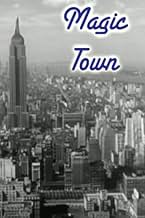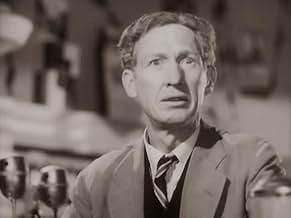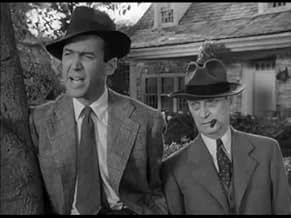AVALIAÇÃO DA IMDb
6,4/10
1,9 mil
SUA AVALIAÇÃO
Adicionar um enredo no seu idiomaAn opinion pollster finds a town which is a perfect mirror of U.S. opinions.An opinion pollster finds a town which is a perfect mirror of U.S. opinions.An opinion pollster finds a town which is a perfect mirror of U.S. opinions.
- Direção
- Roteiristas
- Artistas
- Prêmios
- 1 vitória no total
Avaliações em destaque
A year before this film came out there were major news stories about a `perfect American city,' but once the story broke
so did the illusion. People had to learn the perfect society has to be practiced individually, intentionally and daily for it to become a reality.
I just re-watched this film again today and was very entertained by James Stewart (winking and charming) and Jane Wyman (smart and sexy). Packed with the Robert Riskin type characters this story lacks the `real' message of his earlier films and there in lies it's only weakness. It's a fun trip but after we've gone in circles for a while we are reminded there is no place like home. Still this film has lots of treasures in the performances, dialogue, physical comedy and rich diversity home spun Americana characters. I recommend this to all fans of the Capra-Riskin genre.
P.S. It's also your last chance to enjoy the work of Ned Sparks & Donald Meek who both died after completing this minor masterpiece of Riskin-corn.
I just re-watched this film again today and was very entertained by James Stewart (winking and charming) and Jane Wyman (smart and sexy). Packed with the Robert Riskin type characters this story lacks the `real' message of his earlier films and there in lies it's only weakness. It's a fun trip but after we've gone in circles for a while we are reminded there is no place like home. Still this film has lots of treasures in the performances, dialogue, physical comedy and rich diversity home spun Americana characters. I recommend this to all fans of the Capra-Riskin genre.
P.S. It's also your last chance to enjoy the work of Ned Sparks & Donald Meek who both died after completing this minor masterpiece of Riskin-corn.
I have to admit the premise behind Magic Town was a really good and original one. The fact that small time pollster James Stewart discovers a town that is a microcosm of American thinking. What a shortcut, just move in there and poll the citizens on any question. But you have to do it with subterfuge and the town can never have any marked growth of any kind or the goose that's laying Stewart's golden egg is cooked.
Enter Jane Wyman, acting editor of the small town paper who has some ideas about getting the town to grow. That sets up the conflict with Stewart and then the romantic complications set in. Their romance and their differing agendas set the tone for the rest of the film.
I think with a lighter touch this could have been a classic film. It's not a bad film, it's moving in spots, but the subject matter doesn't lend itself to Frank Capra type populism. I'm sure this is a property that Capra himself must have rejected.
Stewart and Wyman are ably supported by the usual group of great character performers that usually populate a Capra film. William Wellman directed this and I think he was out of his element. He's so much better in action films.
It's also so old fashioned in its view of small town America. I can't believe that such a place like Grandview could possibly exist. Think about it, a cross section of America would have its bad people too among the population. Not a bad person in the whole town.
And they even list a U.S. Senator in their population. That would in and of itself make it atypical by his mere presence. In fact when this film was made Harry Truman was president and certainly Independence, Missouri has never been "typical" since he came to political prominence.
My favorite scene is the dance where the whole crowd except the outsider Stewart sing the high school song. It's sung to the tune of I'll Take You Home Again, Kathleen. It's a nice moment and it demonstrates just how alien big city slicker Jimmy Stewart is in this environment. It's good, but it does tip over into the saccharine.
Both Stewart and Wyman have certainly done better, but fans of both these performers will like it. But can you imagine what someone like Preston Sturges would have done with this material?
Enter Jane Wyman, acting editor of the small town paper who has some ideas about getting the town to grow. That sets up the conflict with Stewart and then the romantic complications set in. Their romance and their differing agendas set the tone for the rest of the film.
I think with a lighter touch this could have been a classic film. It's not a bad film, it's moving in spots, but the subject matter doesn't lend itself to Frank Capra type populism. I'm sure this is a property that Capra himself must have rejected.
Stewart and Wyman are ably supported by the usual group of great character performers that usually populate a Capra film. William Wellman directed this and I think he was out of his element. He's so much better in action films.
It's also so old fashioned in its view of small town America. I can't believe that such a place like Grandview could possibly exist. Think about it, a cross section of America would have its bad people too among the population. Not a bad person in the whole town.
And they even list a U.S. Senator in their population. That would in and of itself make it atypical by his mere presence. In fact when this film was made Harry Truman was president and certainly Independence, Missouri has never been "typical" since he came to political prominence.
My favorite scene is the dance where the whole crowd except the outsider Stewart sing the high school song. It's sung to the tune of I'll Take You Home Again, Kathleen. It's a nice moment and it demonstrates just how alien big city slicker Jimmy Stewart is in this environment. It's good, but it does tip over into the saccharine.
Both Stewart and Wyman have certainly done better, but fans of both these performers will like it. But can you imagine what someone like Preston Sturges would have done with this material?
"Magic Town" is a film about something that we nowadays take as normal but which was a novelty in 1947. It was about the new "science" of public opinion polling. This was only understood poorly and not only by the public but by those who actually mattered: the politicians who would grow to need them. In 1936 the Literary Digest, a popular magazine of the day, had conducted a poll of it's membership on who would win the Presidency. It concluded that Governor Alfred Landon of Kansas, a capable man, would beat incumbent President Franklin Roosevelt. Unfortunately the readership of the Digest were upper class, and basically Republican (as Landon was). In November 1936 FDR won one of the biggest landslides in political history, with three quarters of the popular vote and all the electoral votes except for those of Maine and Vermont. Literary Digest went out of business shortly afterwords. In the decade since Roper and Gallup had been improving polling techniques, but the full system was still uncertain. In the 1948 election there would be another polling snafu, with most of the polls awarding the election to Governor Thomas Dewey of New York, as opposed to incumbent President Harry Truman. Harry won a remarkable come-from-behind over Tom, and enjoyed showing off a headline from the Republican "Chicago Tribune" saying that Tom won.
In the midst of all this there was a classic sociology study entitled "Middletown". Set in the typical mid-American town (it was in the Midwest) the authors (a husband and wife team) showed how it's citizens opinions mirrored what mid-America believed. Ten years later the same authors published a follow up study of the town, and it turned there was little change in the opinion differentials between the town and the country.
It is with the "Middletown" study that the background of this film was based. Jimmy Stewart and his assistants (including Ned Sparks and Donald Meek - in his last role) are pollsters, and Stewart has a theory he has been working on that would save pollsters millions. He believes there is a perfect community in the middle of America that can be used for polling it's citizens. He has been studying the problem for several years, and he has found a town where the percentages of the opinions of the citizens perfectly mirror those of the American people as a whole. Stewart goes to the town and sets up there with the intention of using the citizens as his poling guinea pigs, but (as the movie progresses) he gets involved with Jane Wyman and the others in the town. When Wyman discovers Stewart's plans she reveals them, and the town goes crazy. Their sudden unofficial power goes to their heads, and instead of giving the sensible polling answers to questions they give outlandish ones. This causes the crash of their reputation, and the crisis of the film.
It is a first rate film and has some nice touches (including Gabriel Heater intoning on the radio). As an early story regarding the polling industry it is unique, and the film is well acted and directed (by William Wellman). Perhaps not a Capra movie, but it is a nice one all the same.
In the midst of all this there was a classic sociology study entitled "Middletown". Set in the typical mid-American town (it was in the Midwest) the authors (a husband and wife team) showed how it's citizens opinions mirrored what mid-America believed. Ten years later the same authors published a follow up study of the town, and it turned there was little change in the opinion differentials between the town and the country.
It is with the "Middletown" study that the background of this film was based. Jimmy Stewart and his assistants (including Ned Sparks and Donald Meek - in his last role) are pollsters, and Stewart has a theory he has been working on that would save pollsters millions. He believes there is a perfect community in the middle of America that can be used for polling it's citizens. He has been studying the problem for several years, and he has found a town where the percentages of the opinions of the citizens perfectly mirror those of the American people as a whole. Stewart goes to the town and sets up there with the intention of using the citizens as his poling guinea pigs, but (as the movie progresses) he gets involved with Jane Wyman and the others in the town. When Wyman discovers Stewart's plans she reveals them, and the town goes crazy. Their sudden unofficial power goes to their heads, and instead of giving the sensible polling answers to questions they give outlandish ones. This causes the crash of their reputation, and the crisis of the film.
It is a first rate film and has some nice touches (including Gabriel Heater intoning on the radio). As an early story regarding the polling industry it is unique, and the film is well acted and directed (by William Wellman). Perhaps not a Capra movie, but it is a nice one all the same.
Maybe the silliest story ever to make it onto the silver screen. James Stewart plays a pollster looking for a town of such mathematical perfection that, whatever you polled its people, it would reflect exactly what the entire nation would feel about a give subject. He finds this place in Grandview, and there he takes his team. When Stewart finds local newspaper editor Jane Wyman trying to convince the town council to build a new civic center, he butts in. If the town were to change at all, its magical polling phenomenon could fade. Similar to The Music Man, Stewart develops a relationship with Wyman to keep the town as it is. Fortunately, it's less cynical and fake than the relationship between the two main characters of The Music Man, and, where Robert Preston's love still seems suspicious by the end of that film, Stewart's feels genuine quickly. He doesn't want the miracle to end, but he is utterly seduced not only by Wyman, but also by the small town. When the town discovers their perfect polling ability, they screw it up pretty much instantly (79% of the population say they would vote for a woman president!). The town goes down the toilet, and it's up to some faithful citizens, joined by the reformed Stewart, to save it. As ridiculous as the initial concept for Magic Town is, it gets even worse near the end. Stewart did this film directly after It's a Wonderful Life, and the small town sentiment is nearly identical in both films. While the first touches me, it's simply schmaltzy in Magic Town. The performances by Stewart and Wyman, as well as many decent supporting performances from many ever-reliable character actors, are better than the movie deserves. Stewart, in particular, is great. I've never seen this guy give a bad performance, and he throws himself behind this awful script with his full soul. He almost got me to buy it. Wyman's beautiful eyes enchanted me. But in the end, the story was just too ludicrous. 6/10.
Certainly not one of the great comedies, but charming and rather whimsical in its own way. In this day and age of raucous and crude humour (if you can call it that), a movie like "Magic Town" will probably seem hopelessly old-fashioned and dated, but for those who prefer a quieter and more gentle humour, "Magic Town" will fill the bill very nicely. Very Frank Capra-like (not surprisingly since screenwriter Robert Riskin collaborated with Capra numerous times), "Magic Town" reminds us of a by-gone era, a time when living in a small town meant knowing your neighbours, pride in your community, and the moral values of common decency and humility were still part of everyday life. James Stewart as the pollster who discovers a town full of people whose opinions exactly mirror the national thinking gives his customary good performance, as does Jane Wyman as the newspaper publisher who wants to see change in the town. Many well-known character actors (Kent Smith, Wallace Ford, Ann Shoemaker and particularly Ned Sparks) provide capable support. A slight offering, perhaps, but quite worthwhile.
Você sabia?
- Erros de gravaçãoAt the soda fountain, between shots, the drinks are full, then half empty, then full again.
- Citações
Mary Peterman: The air becomes charged with electricity around desperate men.
- Versões alternativasAlso available in a colorized version.
- ConexõesFeatured in Cinéma de minuit: La cité magique (2024)
Principais escolhas
Faça login para avaliar e ver a lista de recomendações personalizadas
- How long is Magic Town?Fornecido pela Alexa
Detalhes
- Data de lançamento
- País de origem
- Idioma
- Também conhecido como
- Cidade Mágica
- Locações de filme
- Empresa de produção
- Consulte mais créditos da empresa na IMDbPro
- Tempo de duração
- 1 h 43 min(103 min)
- Cor
- Proporção
- 1.37 : 1
Contribua para esta página
Sugerir uma alteração ou adicionar conteúdo ausente





































